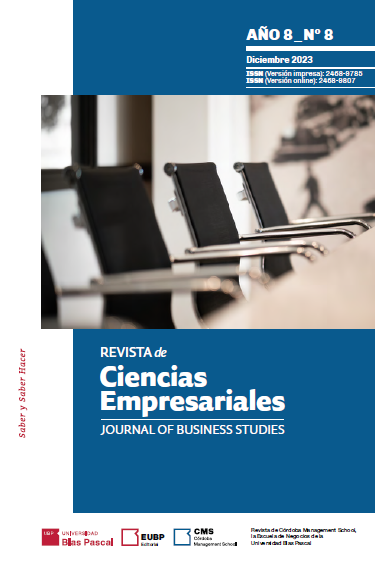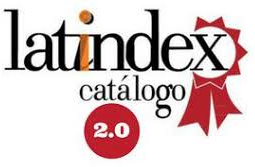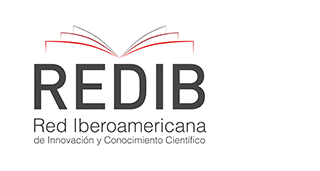Sostenibilidad de cadenas de suministro: Caracterización y Gestión
Sustainability of supply chains: Characterization and Management
DOI:
https://doi.org/10.37767/2468-9785(2023)002Palabras clave:
sostenibilidad, cadenas de suministro, estrategia, operaciones, sustainability, supply chains, strategy, operationsResumen
La gestión de la sostenibilidad de las cadenas de suministro trae consigo beneficios a las organizaciones, sociedad y planeta al equilibrar el aspecto económico, ambiental y social. Por tanto, el objetivo de investigación consiste en describir las características de la gestión de la sostenibilidad de cadena de suministro en empresas de la industria de manufactura.
Abstract
Sustainability Supply chain management brings benefits to organizations, society and the planet by balancing economic, environmental and social aspects. Therefore, the research objective is to describe the characteristics of supply chain sustainability management in companies in the manufacturing industry.
Referencias
Ahi, P., & Searcy, C. (2013). A comparative literature analysis of definitions for green and sustainable supply chain management. Journal of cleaner production, 52, 329-341.
Ansari, Z. N., & Kant, R. (2017). A state-of-art literature review reflecting 15 years of focus on sustainable supply chain management. Journal of cleaner production, 142, 2524-2543
Barney, J. (1991). Firm resources and sustained competitive advantage. Journal of management, 17(1), 99-120.
Barney, J. B. (2012). Purchasing, supply chain management and sustained competitive advantage: The relevance of resource‐based theory. Journal of supply chain management, 48(2), 3-6.
Brandon‐Jones, E., Squire, B., Autry, C. W., & Petersen, K. J. (2014). A contingent resource‐based perspective of supply chain resilience and robustness. Journal of Supply Chain Management, 50(3), 55-73.
Carbonara, N., Giannoccaro, I., & Pontrandolfo, P. (2000). A theoretical model of study industrial districts as supply chains: A case study. LERC, Cardiff.
Chopra, S., y Meindl, P. (2008). Administración de la cadena de Suministro: estrategia. Planeación y Operación (3a. ed.) México. Prentice Hall.
Das, D. (2017). Development and validation of a scale for measuring Sustainable Supply Chain Management practices and performance. Journal of cleaner production, 164, 1344-1362
Diario Oficial de la Federación (2016) Reglas de Operación del Fondo Nacional Emprendedor para el ejercicio fiscal 2017 Recuperado de: https://www.dof.gob.mx/nota_detalle_popup.php?codigo=5468221
Elkington, J. (1998). Partnerships from cannibals with forks: The triple bottom line of 21st‐century business. Environmental quality management, 8(1).
Elkington, J. (2013). Enter the triple bottom line. In The triple bottom line.Routledge.
Feitó Cespón, M., Cespón Castro, R., & Rubio Rodríguez, M. A. (2016). Modelos de optimización para el diseño sostenible de cadenas de suministros de reciclaje de múltiples productos. Ingeniare. Revista chilena de ingeniería, 24(1), 135-148.
Hernández, R., Fernández, C., & Baptista, P. (2014). Metodología de la investigación. Sexta Edición. México.
Hugos, M.(2011) Essentials of supply chain management, Third edition. Wiley, London
INEGI (2015) Micro, pequeña, mediana y gran empresa: estratificación de los establecimientos. Censos Económicos 2014.
Khan, S. A. R., Godil, D. I., Yu, Z., Abbas, F., & Shamim, M. A. (2022). Adoption of renewable energy sources, low‐carbon initiatives, and advanced logistical infrastructure—an step toward integrated global progress. Sustainable Development, 30(1), 275-288.
Mosteanu, N. R., Faccia, A., Ansari, A., Shamout, M. D., & Capitanio, F. (2020). Sustainability integration in supply chain management through systematic literature review. Quality-Access to Success, 21(176), 117-123.
Nunnally, J.C. y I.H. Bernstein, (1994) Psychometric Theory. 3ª ed., New York: mcgraw-Hill
Porter, M. E., & Kramer, M. R. (2006). The link between competitive advantage and corporate social responsibility. Harvard business review, 84(12), 78-92.
Rahman, A. A., Tay, M. y., & Aziz, Y. A. (2016). Potential of Knowledge Management as antecedence of sustainable Supply Chain Management practices. International journal of supply chain management, 5(2), 43-50.
Rajeev, A., Pati, R. K., Padhi, S. S., & Govindan, K. (2017). Evolution of sustainability in supply chain management: A literature review. Journal of Cleaner Production, 162, 299-314.
Sacaluga, A. M., Arca, J. G., Prado, J. C. P., González, A. J. F., & Benavides, J. A. C. (2011). Modelo para la aplicación de la Responsabilidad Social Corporativa en la Gestión de la Cadena de Suministro. Dirección y Organización, (45), 20-31
UNGC (2016). The UN Global Compact Ten Principles and the Sustainable Development Goals: Connecting, Crucially. https://www.unglobalcompact.org/docs/about_the_gc/White_Paper_Principles_SDGs.pdf
Zailani, S., Jeyaraman, K., Vengadasan, G., & Premkumar, R. (2012). Sustainable supply chain management (SSCM) in Malaysia: A survey. International Journal of Production Economics, 140(1), 330-340.
Publicado
Número
Sección
Licencia
Derechos de autor 2024 Revista de Ciencias Empresariales │Universidad Blas Pascal

Esta obra está bajo una licencia internacional Creative Commons Atribución-NoComercial-CompartirIgual 4.0.










